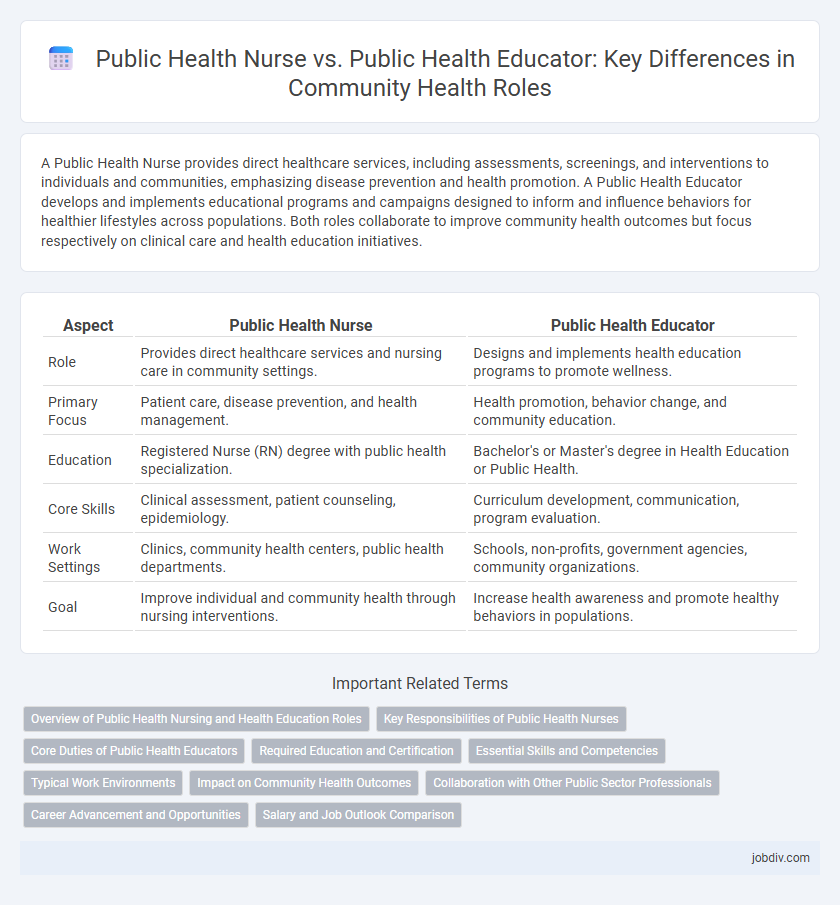A Public Health Nurse provides direct healthcare services, including assessments, screenings, and interventions to individuals and communities, emphasizing disease prevention and health promotion. A Public Health Educator develops and implements educational programs and campaigns designed to inform and influence behaviors for healthier lifestyles across populations. Both roles collaborate to improve community health outcomes but focus respectively on clinical care and health education initiatives.
Table of Comparison
| Aspect | Public Health Nurse | Public Health Educator |
|---|---|---|
| Role | Provides direct healthcare services and nursing care in community settings. | Designs and implements health education programs to promote wellness. |
| Primary Focus | Patient care, disease prevention, and health management. | Health promotion, behavior change, and community education. |
| Education | Registered Nurse (RN) degree with public health specialization. | Bachelor's or Master's degree in Health Education or Public Health. |
| Core Skills | Clinical assessment, patient counseling, epidemiology. | Curriculum development, communication, program evaluation. |
| Work Settings | Clinics, community health centers, public health departments. | Schools, non-profits, government agencies, community organizations. |
| Goal | Improve individual and community health through nursing interventions. | Increase health awareness and promote healthy behaviors in populations. |
Overview of Public Health Nursing and Health Education Roles
Public Health Nurses provide direct community healthcare services, focusing on disease prevention, health promotion, and managing chronic conditions through patient assessments and interventions. Public Health Educators develop and implement educational programs aimed at improving community health literacy and encouraging healthy behaviors by creating targeted materials and campaigns. Both roles collaborate with public health organizations to address population health challenges and reduce health disparities effectively.
Key Responsibilities of Public Health Nurses
Public Health Nurses primarily focus on assessing community health needs, providing direct patient care, and implementing preventative health programs targeting vulnerable populations. They conduct health screenings, administer vaccinations, and manage chronic disease education to reduce health disparities. Collaborating with other healthcare providers, Public Health Nurses also monitor and respond to public health emergencies and outbreaks.
Core Duties of Public Health Educators
Public Health Educators primarily design, implement, and evaluate community health programs to promote wellness and prevent disease, focusing on health education campaigns and behavior change strategies. They conduct research to identify community needs, develop educational materials, and train both the public and health professionals on health topics. Unlike Public Health Nurses who provide direct clinical care, Public Health Educators specialize in outreach, advocacy, and policy development to improve population health outcomes.
Required Education and Certification
Public Health Nurses typically require a Bachelor of Science in Nursing (BSN) degree and must pass the NCLEX-RN exam to obtain licensure as registered nurses, with many pursuing specialized certifications like the Certified Public Health Nurse (CPHN). Public Health Educators often hold a Bachelor's degree in Public Health, Health Education, or related fields, with certifications such as the Certified Health Education Specialist (CHES) enhancing their professional credentials. Both roles benefit from graduate degrees and continuing education to stay current with public health practices and policies.
Essential Skills and Competencies
Public Health Nurses require clinical expertise, patient assessment skills, and the ability to develop care plans tailored to community health needs, emphasizing direct patient care and disease prevention. Public Health Educators excel in communication, program planning, and behavior change theories to design, implement, and evaluate educational initiatives targeting population health improvement. Both roles demand proficiency in cultural competence, data analysis, and community engagement to address public health challenges effectively.
Typical Work Environments
Public Health Nurses primarily work in community health centers, hospitals, schools, and government health departments, providing direct patient care and health education. Public Health Educators are commonly employed in non-profit organizations, public health agencies, schools, and corporate wellness programs, focusing on developing and implementing health promotion campaigns. Both roles often collaborate in community outreach and preventive health initiatives to improve population health outcomes.
Impact on Community Health Outcomes
Public Health Nurses directly influence community health outcomes by providing clinical care, disease prevention, and health promotion through hands-on interventions and personalized patient education. Public Health Educators enhance community health by developing and delivering targeted educational programs that increase awareness, encourage healthy behaviors, and support policy changes. Both roles contribute to reducing health disparities and improving overall population health, but nurses offer clinical expertise while educators focus on behavioral and social determinants of health.
Collaboration with Other Public Sector Professionals
Public health nurses collaborate closely with public health educators, social workers, and epidemiologists to design and implement comprehensive community health programs. Their coordination with local government officials and healthcare providers ensures effective disease prevention and health promotion strategies tailored to population needs. This interdisciplinary teamwork enhances resource allocation and policy development, ultimately improving community health outcomes.
Career Advancement and Opportunities
Public Health Nurses advance through clinical leadership roles, community health program management, and specialized certifications such as infection control or epidemiology, enhancing their scope and salary potential. Public Health Educators expand career opportunities by developing expertise in health communication, grant writing, and policy advocacy, enabling transitions into public health administration and non-profit leadership. Both careers offer pathways in government agencies, healthcare organizations, and academic institutions with growing demand driven by public health initiatives and preventive care priorities.
Salary and Job Outlook Comparison
Public Health Nurses typically earn a median annual salary of around $75,000, reflecting their clinical expertise and direct patient care responsibilities, while Public Health Educators have a median salary closer to $55,000, emphasizing community outreach and health promotion. Job outlook for Public Health Nurses is projected to grow by 12% over the next decade due to increased demand in healthcare settings, whereas Public Health Educators are expected to experience an 11% growth rate driven by rising awareness of preventive health measures. Both roles offer stable employment opportunities, but nurses generally have higher earning potential owing to their specialized medical training and licensure requirements.
Public Health Nurse vs Public Health Educator Infographic

 jobdiv.com
jobdiv.com